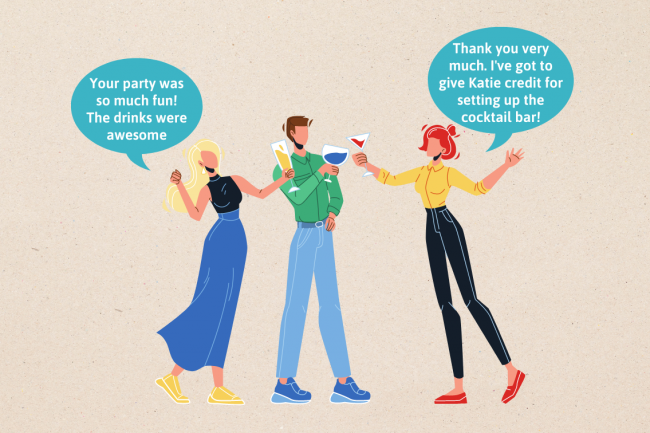Compliments can feel wonderful. But they can also make you feel self-conscious or awkward. If you have low self-esteem or don’t have much confidence in your abilities, compliments might make you feel uncomfortable because they aren’t in line with how you see yourself. You may also struggle to accept compliments if you are worried about appearing arrogant or over-confident.
This article will show you how to respond to a compliment gracefully and humbly, even if you tend to feel uncomfortable whenever someone praises you.
1. Do not dismiss compliments
When you reject a compliment, you are implying that you don’t trust the giver’s judgment or that you don’t think they have good taste, which can come across as insulting.
Avoid brushing off a compliment with a dismissive phrase like “Oh, it was nothing” or “Anyone could have done it; it wasn’t a big deal.” If you catch yourself rejecting a compliment, apologize. For example, you could say, “Sorry for brushing you off! I’m still learning to accept compliments.”
2. Thank the other person for their compliment
The simplest way to accept a compliment is to smile and say “Thank you.” If you feel a “thank you” is too short, you can expand on it slightly.
Here are a few examples that show how you can extend a basic “thank you:”
- “Thank you, much appreciated!”
- “Thanks, it’s kind of you to say so.”
- “Thank you very much.”
- “Thanks, that means a lot.”
- “Thank you so much. That’s made my day!”
3. Tell the other person why you value the compliment
If there’s a special reason why someone’s words of praise mean a lot to you, share it. This kind of response also leaves the other person feeling great because it highlights their positive qualities.
For example, let’s say your very fashionable friend says to you, “That’s a stunning outfit. It really suits you, too.” You could reply, “Thank you very much. Coming from someone as stylish as you, it means a lot!”

4. Give credit to others if it’s appropriate to do so
If someone compliments you on an achievement that you couldn’t have managed without significant help, acknowledge the people who lent a hand. Your relationships could suffer if you don’t give others the credit they deserve.
Here are a couple of examples of how you can give credit to other people while responding to a compliment:
Them: “You did a fantastic job on putting this conference together. You got so many fascinating presenters.”
You: “Thank you very much. Everyone on the team, including the boss, has worked hard to pull it off.”
Them: “This cake is delicious. You’re an awesome chef.”
You: “Thanks, I’m so glad you enjoyed it. I can’t claim all the credit, though. Theresa made the filling.”

Only give someone else credit if they deserve it. Don’t try to deflect a compliment by encouraging the compliment giver to focus on another person.
5. Do not ask for further reassurance
If you ask for reassurance after someone gives you a compliment, you may come across as insecure, fishing for extra compliments, or both.
For example, let’s say someone in your writing class says, “I loved your short story! I didn’t see the final twist coming.” Don’t say something like, “Oh, did you really think so? I thought the ending was kind of weak. You thought it worked?”
6. Keep your body language friendly
Defensive, closed-off body language will probably leave the compliment-giver feeling as though you don’t appreciate what they’ve said, even if you say “Thank you.”
Avoid crossing your arms or frowning. Relax your jaw muscles and smile. If you are responding to a compliment via text or email, you could add a smiling emoji to your message to get the message across.
7. Add a detail that drives the conversation forward
When someone gives you a compliment, they are giving you an opportunity to steer the conversation in a new direction. By adding an extra detail or a question to the end of your “Thank you,” you can revive a dry conversation.
For example, here’s how you can add extra information when accepting a compliment:
Them: “I can’t believe how good you are at skiing!”
You: “Thank you. I just replaced my favorite pair of skis, so it’s been fun to try them out this weekend.”
Them: “Oh, I love your dress. You look beautiful!”
You: “Thank you. I found it in a quirky vintage boutique that’s recently opened in town.”
Here are a couple of examples showing how you can ask a question when responding to a compliment:
Them: “Your garden really looks incredible. You’ve got a talent for landscaping.”
You: “Thank you. Are you a keen gardener as well?”
Them: “These are the best gingerbread cookies I’ve ever tasted. Wow.”
You: “Thank you. I think gingerbread is the best flavor for this time of year! Are you visiting your family over the holidays?”
Don’t rush over the “thank you” part, or the other person might think you are trying to brush over the compliment.
You might also find these tips on how to ask good questions helpful.
8. Give a compliment of your own (sometimes)
Sometimes, the nicest way to respond to a compliment is to give one of your own in return. For example, if your friend says, “I really like your shoes!” during a night out, you could say, “Thanks, I like them too! Love your bag, by the way.”
But make sure your compliment is sincere. Don’t compliment someone just to fill a silence. Allow a brief pause before giving a return compliment, or the other person may get the impression you are dismissing their words.
If you struggle to think of suitable compliments, check out our article on giving sincere compliments that make others feel great.
9. Know how to accept a toast
Toasts can be intimidating if you don’t like being the center of attention. Mastering toasting etiquette will help you handle the situation gracefully.
In most situations, the rules are as follows:
- The toastee should not stand during the toast, and they should not drink to themselves.
- The toastee should smile or nod to show their gratitude.
- After the toast, a toastee can give a toast of their own. The Emily Post Institute has a useful guide to toasting etiquette that contains tips on how to give a great toast.










